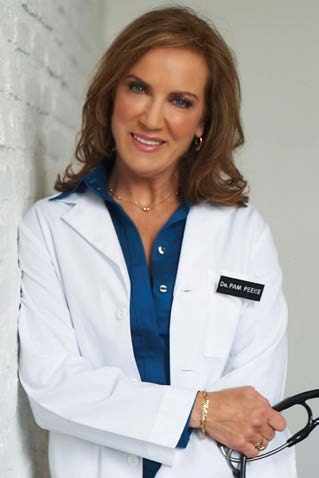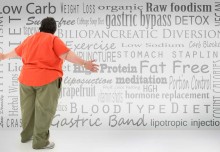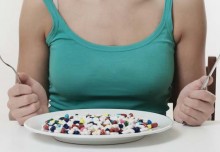If certain foods have you craving more, the reward center of your brain may need a fix. Learn how to recognize your food addiction and overcome it.
 Ever feel like you are addicted to certain foods? Below is my recent interview with Pamela Peeke, MD about her new book on food addiction that hit the New York Times’ best-seller list in just five days after launch. It’s called The Hunger Fix: The Three-Stage Detox and Recovery plan for Over-eating and Food Addiction.
Ever feel like you are addicted to certain foods? Below is my recent interview with Pamela Peeke, MD about her new book on food addiction that hit the New York Times’ best-seller list in just five days after launch. It’s called The Hunger Fix: The Three-Stage Detox and Recovery plan for Over-eating and Food Addiction.
Dr. Pamela Peeke is an internationally renowned physician, scientist, and expert in the fields of nutrition, metabolism, stress and fitness. She is also Chair of Curves International Advisory Board and Chair of the Empow-HER Advisory Board.
Dr. Mache Seibel: Why did you write this book?
Dr. Pamela Peeke: The Hunger Fix is about the brand new science of food addiction. Women often blame them-selves for not being able to stay in good shape, for eating habits that tend to feel like they’re addicted to certain foods, and wondering if they’re going out of their minds. The Hunger Fix is the first consumer book that does the thing I love to do, and you do the same thing, which is to take science, especially brand new science that is very exciting and ground breaking and to translate it into chewable bites that women can use. I’ve written three books that have done that. The first one is Fight Fat After Forty, and this has become “the Bible” of what in heaven’s name is going on with your body when one moment you look like an hourglass and the next day you look like a shot glass. What happened to body fat distribution, and what is the relationship between toxic stress and your body fat distribution after the age of 40 in women?
 In Body for Life for Women, I look at body composition, a brand new science that says, “I don’t give a hoot and a holler about what your weight is, I care about what the quality of that weight is.” In other words, how much fat and how much muscle can you carry on those bones of yours? It’s called body composition. That got women keyed off the craziness of that Olympic event called scale hopping. I’m saying look really carefully at body fat percentage, how much muscle you have and really pay attention to getting an optimum body composition.
In Body for Life for Women, I look at body composition, a brand new science that says, “I don’t give a hoot and a holler about what your weight is, I care about what the quality of that weight is.” In other words, how much fat and how much muscle can you carry on those bones of yours? It’s called body composition. That got women keyed off the craziness of that Olympic event called scale hopping. I’m saying look really carefully at body fat percentage, how much muscle you have and really pay attention to getting an optimum body composition.
In my newest book The Hunger Fix, I’m now going into the science of food addiction. If you thought you were going completely out of your mind when you said, “I just feel so addicted to certain foods,” because they make me want to binge, you are right. There’s no way you can get away with one serving of them, and you feel loss of control.
Dr. Seibel: “Bet you can’t eat just one.”
Dr. Peeke: Exactly! In other words, you flunk the Lay’s potato chip test.
MRIs show precisely the same damage and impairment whether your addiction is alcohol, cocaine or crème brûlée
You can’t have just one, and you’re usually consumed with blame, shame and guilt; and afterwards, something is terribly wrong with this whole picture. The grand majority of food that have you doing that are what we call the hyperpalatables – those sugary, fatty, salty food combos that are refined, processed and prepackaged.
Over the last five years, the scientists and addiction specialists at the National Institute on Drug Abuse found that when they did either brain scans call PET scans or when they used functional MRIs, the reward center of the brain, and what I call the smarty-pants center, the prefrontal cortex right behind your forehead, show precisely the same damage and impairment whether your addiction is alcohol, cocaine or crème brûlée. It’s all the same. The scientists who discovered this were blown away.
Dr. Seibel: So when food is an addiction and you’ve got to have more of it, it doesn’t matter if it is sugar or cocaine, the same parts of your brain will light up and the same part of your brain is saying “give me more.”
Dr. Peeke: Right, which means that by definition, the solution has to include some of the same methods that you use for classic addiction to these other substances with one huge twist. With alcohol and cocaine, you never ever need to drink or use cocaine again; but what about food? Uh-oh, now you’ve got a problem, because you have to let-the-tiger-out-of-the-cage at least three times a day. You’ve got to eat to live. The question is what and how do you live in the landmine of temptation?

Dr. Seibel: So abstinence is not an option?
Dr. Peeke: Actually, abstinence is an option for the specific food that really leaves you with that feeling of loss of control. The thing is, you have to be aware of what those foods are.
Dr. Seibel: Selective abstinence.
Dr. Peeke: Exactly! Also, we have discovered when it comes to food, people can customize how they deal with this by doing an individualized detox and recovery program. Meaning that, with some people, absolutely strict abstinence from certain foods stuff like white flour and refined sugar is the only way they know how to make it work. But there are certain people who can actually be re-exposed in a very controlled way much farther down the path. In my book, there’s a beginner recovery and a master recovery detox.
Dr. Seibel: What you’re saying is, if you do it in an intelligent and informed way, you can actually tiptoe through the minefield and have the opportunity to emerge with less weight and still eat a nutritious healthy and delicious meal.
Dr. Peeke: People contact my website DrPeeke.com, and they say, “Thank God you wrote this book, because I thought I was going out of my mind! Everyone laughed at me and said, ‘Eh, it’s just a bunch of willpower issues and you’re a loser.” Only to find out there was a solid science behind all of this. They now see that there is a problem; but the good news is there are solutions as well. Avoiding the foods that make you binge is so terribly important. Detox relieves the system and allows the reward center and the smarty-pants part of the brain where your willpower is located to heal.
The most important thing is to get off the addictive food long enough to realize, “Oh my gosh! I feel so much more clearheaded…”
The smarty-pants part is called the prefrontal cortex and it helps you make plans, stay vigilant, stay mindful. We see the impairment on PET scans. Someone who is continuously abusing the foods, constantly using it as an anesthetic, is using it to numb their life and pain. Constantly eating way too much of it lights up the reward center. The ability of those people not to eat the food they are addicted to is impaired. Now, is this an excuse? Oh, no. This is a fact; therefore, the most important thing is get off the addictive food long enough to be able to realize, “Oh my gosh! I feel so much more clearheaded. I feel healthier. I feel like I can move forward and take better care of myself.”
Dr. Seibel: What foods are the ones that are the most addictive for people?
Dr. Peeke: Clearly, it’s the sugary, fatty, salty food combos. The grand majority of those are refined and processed. They’re the grab-and-go foods, the fast foods. They are just loaded with sugar, fat (and all the wrong kinds of fat, by the way) and salt. Again, there’s nothing wrong with having for instance, ice cream, a really good ice cream. But, if ice cream is something that you have a history of abusing; if having a small amount of ice cream lights up your reward center and makes you crave more and leaves you with a horrible feeling of being out of control. Guess what? Bye-bye ice cream.
Dr. Seibel: If fast food is lighting up your addiction center, are we better off to drive by instead of drive through?
Dr. Peeke: Exactly. Again, even the fast food restaurants now have grilled chicken on a bed of greens and similar offers. The problem I have with fast food restaurants is, in order to get that healthy option, you’ve got to go into a place that just smells and reeks of all the other tempting foods. It’s like walking through landmines.
And there’s also another issue – cues. When you’re cued to eat, that lights up your reward center more than the consumption of the food itself. This is beautiful work done by Dr. Nora Volkow who is the Director of the National Institute on Drug Abuse of the National Institute of Health.

We live in a multimedia landmine of cues. From the moment you wake up in the morning and turn on the radio, what are you going to listen to? If you turn on the TV, what do you see as a visual? The minute you open up a magazine, there it is. The minute you step outside your home, there are the billboards. Go online, go to the web. You see it everywhere. You’re prefrontal cortex aren’t able to avoid junk food, and it’s very difficult when you’re already abusing the food and you have impaired executive function.
When you’re cued to eat, that lights up your reward center more than the consumption of the food itself
Dr. Seibel: So, you’re now in a situation where you realize that certain foods are a problem. The fast food place may have a healthy choice, but to make that healthy choice have to avoid all the visuals and smells and the familiarities of one thing to reach for the other. On top of that, the part of your brain that’s says, “I wouldn’t do that if I were you, it’s not good for you,” is not functioning well right now so you have less self-control. What can people do to start breaking the cycle other than driving past instead of driving through?
Dr. Pamela Peeke: Go to my website www.DrPeeke. com and click on the Food Addiction page for the Yale University. Take the consumer version assessment, and then hit the little “what’s my answer here” and you’ll know whether or not you have an issue.
Once you’ve gotten to that point, you have to humbly accept you’ve got an issue. You have to realize, “Oh my goodness, I have a problem!” We’ve laid down the blueprint for you. This isn’t just about food. This is about the holistic and integrative blueprint for your whole lifestyle.
Click here to order your copy of The Hunger Fix
To hear the remainder of the interview in its entirety, Click Here.





